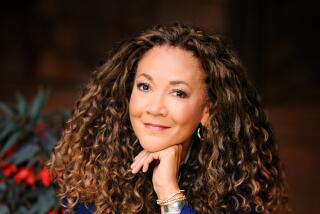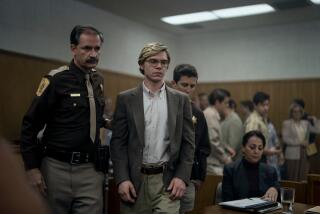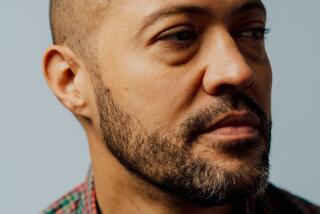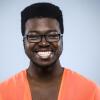Writer-activist Kevin Powell says his new memoir tells ‘a human story’
An original member of the popular MTV reality show “The Real World” and a two-time candidate for Congress, writer and activist Kevin Powell is no stranger to controversy. Throughout his 49 years of life, he’s been painted an angry black man, a woman beater and a thug. But in his new memoir, “The Education of Kevin Powell: A Boy’s Journey into Manhood,” Powell takes control of his own story.
“After I ran for Congress [in 2006] people began making up stuff and twisting the truth,” he said. “I decided, after carrying this idea in my head for 20 years, that if I don’t [ever] write another book, I wanted to bring [my life] all together. I’ve always loved memoirs as an art form, but if you’re going to write one, you should tell the truth.”
The pages of Powell’s book, his 12th, are laced with that unflinching truth as he revisits his first interactions with police as a teen and an adulthood with a number of downfalls including domestic violence, depression and thoughts of suicide. Through it all, however, he developed a formidable career first as a writer and now as a motivational speaker and activist.
Speaking by phone, Powell discussed the state of black men in America, his literary influences and his new memoir.
What did you learn from growing up in the “disadvantaged” parts of Jersey City that you still use to this day?
I did not hear the term “disadvantaged” until I got to college. I knew we didn’t have a color TV and there was an environment of vermin and roaches, but I also saw magic there. What I learned is that I would not trade a single thing in the world from where I came. It teaches you survival and resiliency that you can’t buy anywhere.
You dedicate a chapter to, as you title it, “High School. And the police.” How do those early interactions color your perspective on the current conversation about police brutality?
I didn’t have any [negative] impression of the police until that point. It was the first time that I felt the full brutality of racism from an adult white person. That was unnerving, and I wanted people to feel what I felt. I [now] realize that I could’ve been killed very easily, like Mike Brown was killed. I wanted people to see that this is not new; this has been going on. This is generations of abuse that we’re talking about — systemic racism.
You say writers Sonia Sanchez, Langston Hughes, Zora Neale Hurston and James Baldwin had an impact on you during college. What did you take from them?
[Reading them] was liberating. I didn’t know that black writers existed. I had no idea. It’s so important to see yourself out there, to know that that’s how you can exist. Those black writers gave me confirmation that I could do this with my own life.
Having also penned “The Black Male Handbook,” what to you is the state of the black male in America?
We are, across the board, in a crisis, a crisis of identity. A lot of us have never had discussions around masculinity and manhood. It’s clear that a lot of us are wounded because many of us think there is something wrong with expressing love. Real masculinity, no matter your sexual identity, should be about being vulnerable and free and embracing all sides of who you are, the masculine and the feminine side. And about family and community, however you define family and community. I have to be inclusive of all dimensions of black manhood if I’m being serious about being an artist and activist.
And we have to see women and girls as our equal. Any definition of black masculinity and manhood has to include them as equals. We also have to acknowledge things like the Black Lives Matter movement wouldn’t exist if it wasn’t for black women or our gay brothers and sisters.
Your next project is a biography of Tupac Shakur, whom you interviewed numerous times while at Vibe magazine. How did he affect your life and what do you think others can take from his particular story?
My activism led me to Tupac. I saw it as an opportunity to document someone who was able to appeal to a cross section of people. There was something remarkable about the charisma he had that made people want to look. Literally, my career was propelled by Tupac and he didn’t make it past 25. Tupac’s life and my life are cautionary tales: It’s easy to get caught up, but if you don’t have a foundation and aren’t clear about your purpose, you will die. For some it will be literal and for others it will be soul suicide.
Famed feminist scholar bell hooks says your book should be read by anyone who claims to care about the fate of black males in America. What do you hope readers will take away from your story?
I hope people see it as a human story, no matter their race, culture, gender, sexuality or ability. I also hope folks learn from my mistakes. I did my best to tell the truth. I pray that people also see that there is hope and possibilities. If we can learn how to love ourselves no matter where we come from and embrace every part of who we are, I think we can find meaning to life. When I say “The Education of Kevin Powell,” it’s really about the education of us all.
Powell will host a book-signing event at 7 p.m. Nov. 12 at Madera Kitchen, 1835 N. Cahuenga Blvd., Los Angeles.
Twitter: @TrevellAnderson
More to Read
Sign up for our Book Club newsletter
Get the latest news, events and more from the Los Angeles Times Book Club, and help us get L.A. reading and talking.
You may occasionally receive promotional content from the Los Angeles Times.







